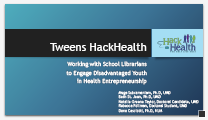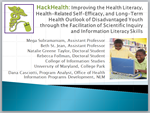HackHealth: Engaging tweens in seeking and utilizing health information. Research poster to be presented at the American Library Association Annual Conference, Las Vegas, NV, June 26 – July 1, 2014.
Abstract: The American Medical Association (2007) reports that “literacy is a stronger predictor of an individual’s health status than income, employment status, education level, and racial or ethnic group” (p. 13). Aiming to help improve the health literacy of disadvantaged tweens and reduce health disparities, researchers at the University of Maryland collaborated with three Title 1 middle school librarians to co-design HackHealth, a program funded by the National Library of Medicine. Participating tweens improve their health literacy skills by looking for and evaluating online health-related information so they can use this knowledge to make smart and healthy life choices. In addition to learning about a specific health topic of their own choosing, students learn about different aspects of digital literacy, such as identifying keywords, refining search terms, analyzing/interpreting search engine results, and evaluating the relevance and credibility of websites. Students create final projects of their research using a medium of their choice to present their findings to their families and each other. At the end of the program at each school, feedback about the program is gathered through follow-up interviews with the students as well as focus groups with the students and their parents. Additionally, a pre-program survey and post-program survey are administered in each school to gauge changes in the students’ perceptions regarding their interest in health, their health literacy, and their health-related self-efficacy. Photographs, student and parent quotes, and sample final projects will be used to showcase the impact HackHealth has had on participating students’ health and digital literacies.


 “HackHealth: Improving the Health Literacy, Health-Related Self-Efficacy, and Long-Term Health Outlook of Disadvantaged Youth through the Facilitation of Scientific Inquiry and Information Literacy Skills.”
“HackHealth: Improving the Health Literacy, Health-Related Self-Efficacy, and Long-Term Health Outlook of Disadvantaged Youth through the Facilitation of Scientific Inquiry and Information Literacy Skills.”